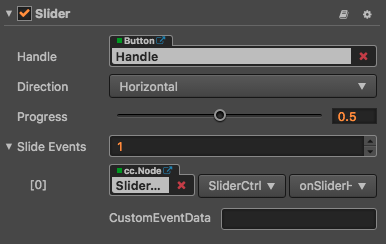Slider component reference
Slider is a slider component, For the production of UI components such as volume adjustment.


Click the Add Component button at the bottom of the Properties panel and select Slider from UI Component. You can then add the Slider component to the node.
Please refer to the script interface of the slider Slider API
Slider property
| Property | Function explanation |
|---|---|
| handle | Slider button parts can be adjusted through the button to adjust the size of the Slider value |
| direction | The direction of the slider is divided into horizontal and vertical |
| progress | Current progress value, the value of the interval is between 0-1 |
| slideEvents | Slider component event callback function |
Slider event

| Attributes | Function explanation |
|---|---|
| Target | Node with script component |
| Component | Script component name |
| Handler | Specifies a callback function that will be called when the Slider event occurs |
| CustomEventData | The user specifies an arbitrary string as the last argument of the event callback |
Slider event callback has two parameters, the first parameter is the Slider itself, the second parameter is CustomEventData
Detailed explanation
Slider is usually used to adjust the value of the UI (for example, volume adjustment), it is the main component of a slider button, which is used for user interaction, which can be adjusted by the size of the Slider.
Usually a Slider node tree as shown below:

Add a callback by script code
Method one
The event callback added by this method is the same as the event callback added by the editor, all added by code. First you need to construct a cc.Component.EventHandler object, and then set the corresponding target, component, handler and customEventData parameters.
var sliderEventHandler = new cc.Component.EventHandler();
sliderEventHandler.target = this.node; // Is the node of your event handling code component
sliderEventHandler.component = "cc.MyComponent"
sliderEventHandler.handler = "callback";
sliderEventHandler.customEventData = "foobar";
slider.slideEvents.push(sliderEventHandler);
// here is your component file
cc.Class({
name: 'cc.MyComponent'
extends: cc.Component,
properties: {
},
callback: function(slider, customEventData) {
// Where slider is a cc.Slider object
// Where the customEventData parameter is equal to the "foobar"
}
});
Method two
By slider.node.on('slide', ...) way to add
// Suppose we add event handling callbacks to the onLoad method of a component and perform event handling in the callback function:
cc.Class({
extends: cc.Component,
properties: {
slider: cc.Slider
},
onLoad: function () {
this.slider.node.on('slide', this.callback, this);
},
callback: function (Slider) {
// The parameter of the callback is the Slider component.
// do whatever you want with Slider
}
});